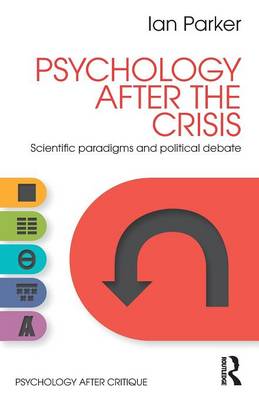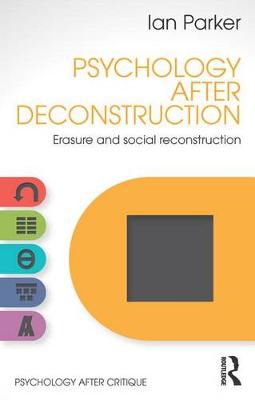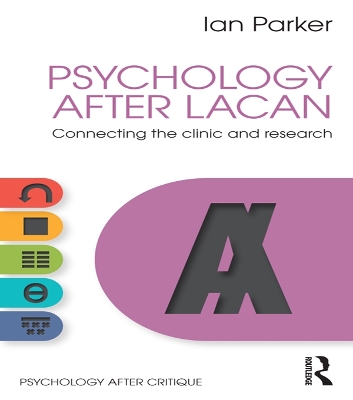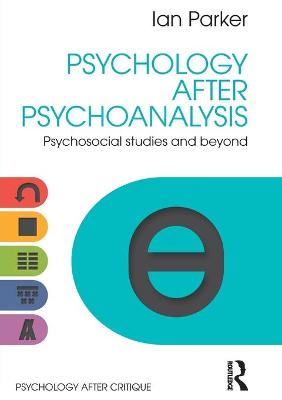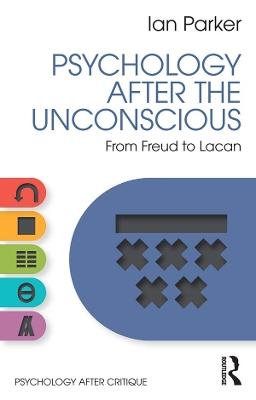Psychology After Critique
5 total works
Ian Parker has been a leading light in the fields of critical and discursive psychology for over 25 years. The Psychology After Critique series brings together for the first time his most important papers. Each volume in the series has been prepared by Ian Parker, features a newly written introduction and presents a focused overview of a key topic area.
Psychology After the Crisis is the first volume in the series and addresses three important questions:
- What was the crisis in psychology and why does it continue now?
- How did debates regarding the traditional ‘laboratory experiment’ paradigm in psychology set the scene for discourse analysis?
- Why are these paradigm debates now crucial for understanding contemporary critical psychology?
The first two chapters of the book describe the way critical psychology emerged in Britain during the 1970s, and introduce four key theoretical resources: Marxism, Feminism, Post-Structuralism and Psychoanalysis. The chapters which follow consider in depth the critical role of Marxist thinking as an analytic framework within psychology. Subsequent chapters explore the application and limitations of critical psychology for crucial topics such as psychotherapy, counselling and climate change. A final chapter presents an interview which reviews the main strands within critical psychology, and provides an accessible introduction to the series as a whole.
Psychology After the Crisis is essential reading for students and researchers in psychology, sociology, social anthropology and cultural studies, and for discourse analysts of different traditions. It will also introduce key ideas and debates in critical psychology for undergraduates and postgraduate students across the social sciences.
Ian Parker has been a leading light in the fields of critical and discursive psychology for over 25 years. The Psychology After Critique series brings together for the first time his most important papers. Each volume in the series has been prepared by Ian Parker, and presents a newly written introduction and focused overview of a key topic area.
Psychology After Deconstruction is the second volume in the series and addresses three important questions:
- What is ‘deconstruction’ and how does it apply to psychology?
- How does deconstruction radicalize social constructionist approaches in psychology?
- What is the future for radical conceptual and empirical research?
The book provides a clear account of deconstruction, and the different varieties of this approach at work inside and outside the discipline of psychology. In the opening chapters Parker describes the challenge to underlying assumptions of ‘neutrality’ or ‘objectivity’ within psychology that deconstruction poses, and its implications for three key concepts: humanism, interpretation and reflexivity. Subsequent chapters introduce several lines of debate, and discuss their relation to mainstream axioms such as ‘psychopathology’, ‘diagnosis’ and ‘psychotherapy’, and alternative approaches like qualitative research, humanistic psychology and discourse analysis. Together, the chapters in this book show how, via a process of ‘erasure’, deconstructive approaches question fundamental assumptions made about language and reality, the self and the social world. By demonstrating the application of deconstruction to different areas of psychology, it also seeks to provide a ‘social reconstruction’ of psychological research.
Psychology After Deconstruction is essential reading for students and researchers in psychology, sociology, social anthropology and cultural studies, and for discourse analysts of different traditions. It will also introduce key ideas and debates within deconstruction to undergraduates and postgraduate students across the social sciences.
Ian Parker has been a leading light in the fields of critical and discursive psychology for over 25 years. The Psychology After Critique series brings together for the first time his most important papers. Each volume in the series has been prepared by Ian Parker and presents a newly written introduction and focused overview of a key topic area.
Psychology After Lacan is the sixth volume in the series and addresses three central questions:
- Why is Lacanian psychoanalysis re-emerging in mainstream contemporary psychology?
- What is original in this account of the human subject?
- What implications does Lacanian psychoanalysis have for psychology?
This book introduces Lacan’s influential ideas about clinical psychoanalysis and contemporary global culture to a new generation of psychologists. The chapters cover a number of key themes including conceptions of the human subject within psychology, the uses of psychoanalysis in qualitative research, different conceptions of ethics within psychology, and the impact of cyberspace on human subjectivity. The book also explores key debates currently occurring in Lacanian psychoanalysis, with discussion of culture, discourse, identification, sexuality and the challenge to mainstream notions of normality and abnormality.
Psychology After Lacan is essential reading for students and researchers in psychology, psycho-social studies, sociology, social anthropology and cultural studies, and to psychoanalysts of different traditions engaged in academic research. It will also introduce key ideas and debates within critical psychology to undergraduates and postgraduate students across the social sciences.
Ian Parker has been a leading light in the fields of critical and discursive psychology for over 25 years. The Psychology After Critique series brings together for the first time his most important papers. Each volume in the series has been prepared by Ian Parker and presents a newly written introduction and focused overview of a key topic area.
Psychology After Psychoanalysis, the fourth volume in the series, is about the impact of psychoanalysis on critical debates in psychology. It addresses three central questions:
- Why is psychoanalysis re-emerging within psychology?
- How can psychoanalytic ideas inform psychosocial research?
- How does psychoanalysis explain the relation between the individual and society?
International in scope, the book includes a clear account of psychoanalysis, and the different varieties of the approach that are at work inside and outside the discipline of psychology. It explores the status of psychoanalysis as a series of concepts and as a methodology, and shows how its clinical practice is crucial to the way that it operates now in an academic context. In doing so, the book sheds light on the arguments currently occurring inside psychoanalysis, with discussion of its relation to critical psychology, psychosocial research, the health professions, culture and social theory.
Parker shows how psychoanalysis rests on a notion of ‘method’ that is very different from mainstream psychology, and unravels the implications of this difference. Early chapters examine the lines of debate between various psychoanalytical traditions, and show how critical psychology challenges the assumptions about human nature and subjectivity made in conventional psychoanalysis. Later chapters introduce the methodological device of ‘transference’ and explore how psychoanalysis may be utilized as a resource to review key questions of human culture.
Psychology After Psychoanalysis is essential reading for students and researchers in psychology, psychosocial studies, sociology, social anthropology and cultural studies, and to psychoanalysts of different traditions engaged in academic research.
Ian Parker has been a leading light in the fields of critical and discursive psychology for over 25 years. The Psychology After Critique series brings together for the first time his most important papers. Each volume in the series has been prepared by Ian Parker and presents a newly written introduction and focused overview of a key topic area.
Psychology After the Unconscious is the fifth volume in the series and addresses three central questions:
- Why is Freud’s concept of the unconscious important today?
- Does language itself play a role in the creation of the unconscious?
- How does Lacan radicalize Freud’s notion of the unconscious in relation to cultural research?
The book provides a clear explanation of Freudian and Lacanian accounts of the unconscious. It also highlights their role in offering a new way of describing, understanding and working with the human subject in clinical settings and in cultural research. Part One shows how the unconscious is elaborated in Freud’s early case studies in Studies on Hysteria, while Part Two focuses on Lacan’s re-working of the unconscious and its relationship to language and culture in his influential public seminars. The book also provides access to key debates currently occurring in Freudian and Lacanian psychoanalysis, exploring both the clinical dimension and the consequences for psychological and cultural research.
Psychology After the Unconscious is essential reading for students and researchers in psychology, psychosocial studies, sociology, social anthropology and cultural studies, and to psychoanalysts of different traditions engaged in academic research. It will also introduce key ideas and debates within critical psychology to undergraduates and postgraduate students across the social sciences.
